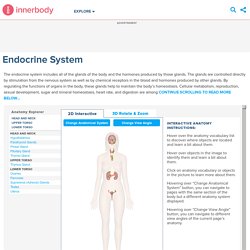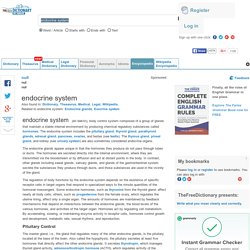

Endocrine System: Discover the Anatomy and Function of Glands. The endocrine system includes all of the glands of the body and the hormones produced by those glands.

The glands are controlled directly by stimulation from the nervous system as well as by chemical receptors in the blood and hormones produced by other glands. By regulating the functions of organs in the body, these glands help to maintain the body’s homeostasis. Cellular metabolism, reproduction, sexual development, sugar and mineral homeostasis, heart rate, and digestion are among Continue Scrolling To Read More Below... Continued From Above... Endocrine System. Listen Problems With the Endocrine System Too much or too little of any hormone can be harmful to the body.

For example, if the pituitary gland produces too much growth hormone, a child may grow excessively tall. If it produces too little, a child may be abnormally short. Controlling the production of or replacing specific hormones can treat many endocrine disorders in children and adolescents, some of which include: Adrenal insufficiency. Cushing syndrome. Symptoms may take years to develop and include obesity, growth failure, muscle weakness, easy bruising of the skin, acne, high blood pressure, and psychological changes. Type 1 diabetes. Type 1 diabetes can cause long-term complications, including kidney problems, nerve damage, blindness, and early coronary heart disease and stroke. Type 2 diabetes. The symptoms and possible complications of type 2 diabetes are basically the same as those of type 1.
Endocrine System: MedlinePlus. See all Endocrine System topics.

Endocrine system. Human Anatomy: Learn All About the Human Body at InnerBody.com. Endocrine gland hormone review (video) Article about endocrine system by The ... Endocrine system (ĕn`dəkrĭn), body control system composed of a group of glands that maintain a stable internal environment by producing chemical regulatory substances called hormoneshormone,secretory substance carried from one gland or organ of the body via the bloodstream to more or less specific tissues, where it exerts some influence upon the metabolism of the target tissue......

Click the link for more information. . The endocrine system includes the pituitary glandpituitary gland,small oval endocrine gland that lies at the base of the brain. It is sometimes called the master gland of the body because all the other endocrine glands depend on its secretions for stimulation (see endocrine system)...... Click the link for more information. , thyroid glandthyroid gland,endocrine gland, situated in the neck, that secretes hormones necessary for growth and proper metabolism.
The endocrine glands appear unique in that the hormones they produce do not pass through tubes or ducts. Insects. Endocrine System - Everything You Need to Know. The endocrine system consists of several glands located throughout the body.

These glands secrete hormones -- chemical messengers that signal the body to perform essential functions, usually related to growth and metabolism. There are two types of glands within the endocrine system. Endocrine glands include the pancreas, thyroid, pituitary and adrenal glands. They secrete their hormones directly into the bloodstream, where they are carried to the site of action. Exocrine glands secrete their hormones directly into ducts.
How Do Hormones Work? Many endocrine glands are sensitive to the concentration of either the hormone they produce or the substance that activates them. When receptors on the cell membranes of an endocrine gland are activated by a particular hormone, a cascade of chemical events is triggered within the cell.